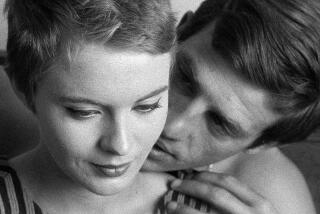Gilbert Becaud, 74; Singer Wrote ‘What Now, My Love’
- Share via
French singer Gilbert Becaud, a master of the romantic song whose best-known composition was “What Now, My Love?”, died in Paris on Tuesday after a long battle with cancer. He was 74.
Becaud became a star in the 1950s in the tradition of Charles Trenet and Charles Aznavour. He earned the nickname “Monsieur 100,000 Volts” when fans smashed the chairs at Paris’ Olympia Theater after an electrifying performance in 1954.
For the record:
12:00 a.m. Dec. 21, 2001 FOR THE RECORD
Los Angeles Times Friday December 21, 2001 Home Edition Part A Part A Page 2 A2 Desk 1 inches; 20 words Type of Material: Correction
Becaud obituary--In French singer Gilbert Becaud’s obituary in Wednesday’s California section, the name of singer Vikki Carr was misspelled.
He was best known in the United States as a composer whose songs were performed by Sammy Davis Jr., Frank Sinatra, Barbra Streisand, Liza Minnelli and Neil Diamond.
“What Now, My Love?” was recorded 150 times by such artists as Shirley Bassey, Sarah Vaughan, Elvis Presley and Streisand. Sinatra and Aretha Franklin sang it as a duet, and Sonny and Cher also had a famous version. But Becaud’s favorite rendition was by Judy Garland, whose emotional intensity reminded him of Edith Piaf, the French chanteuse who helped launch his songwriting career.
He also wrote “Let It Be Me,” a 1960 hit for the Everly Brothers, and “It Must Be Him,” recorded by Vicki Carr in 1967.
In France he was beloved as an interpreter of the traditional French chanson, which emphasizes poetry and romanticism. Among the more than 400 songs he wrote, “L’important c’est la Rose” (“What’s Important Is the Rose”) and “Nathalie” were French favorites.
Becaud was born Francois Gilbert Silly in Toulon, on the French Mediterranean coast. After studying piano at conservatories in Nice and Toulon in the early 1940s, he joined the French Resistance during World War II.
After the war he played piano in nightclubs and began to write songs. One of his first successes was “Je t’ai Dans la Peau,” a collaboration written with Pierre Delanoe for Piaf in 1950. Piaf and Aznavour were helpful in launching him as a songwriter.
“His spirit and his extraordinary optimism, along with his desire to shake up the world of the chanson, struck me from the first moment I met him,” Aznavour told Agence-France Presse on Tuesday.
Becaud began to concentrate more on singing when he suffered a minor hand injury that affected his piano playing.
By the 1950s, he was a sensation in France. He became known not only as “Monsieur 100,000 Volts” but as “Monsieur Dynamite” and “The Atomic Mushroom.”
He had a one-man show on Broadway in 1966. He returned two decades later with a musical, “Roza,” about a former prostitute who raises a young Arab boy in a rundown section of Paris. It was based on a Romain Gary novel, “La Vie Devant Soi,” that later became the Oscar-winning film “Madame Rosa” starring Simone Signoret.
Developed at Center Stage, a resident theater in Baltimore, and at the Mark Taper Forum in Los Angeles, the musical was staged by Harold Prince and written with British lyricist Julian More.
It earned mixed reviews but critics generally liked Becaud’s music.
“Audiences who resent theater songs that have to be figured out will love Gilbert Becaud’s songs,” Times critic Dan Sullivan wrote. “As in his ‘What Now, My Love,’ they deal in one thought at a time. . . .It’ll be a shame if there isn’t an original cast album.”
Becaud announced his retirement from touring in 1991 after almost 40 years as a performer giving up to 249 concerts a year around the world.
He once said he owed his longevity as performer to his energetic performance style.
“When I write a song, when I jump on stage, I do it from the heart, from the gut, like tennis players who shout when they land a serve,” he once said. “I’m not the kind of guy who thinks. I’m not a careerist who plots his next move.”
He released his last album, “Faut Faire Avec” (Have to Make Do) in 1999. More serious than previous recordings, it reflected his determination to battle cancer.
He had successfully beaten back cancer of the jaw several years ago. When he learned it was in remission, he celebrated by smoking a cigarette.
More to Read
The biggest entertainment stories
Get our big stories about Hollywood, film, television, music, arts, culture and more right in your inbox as soon as they publish.
You may occasionally receive promotional content from the Los Angeles Times.










